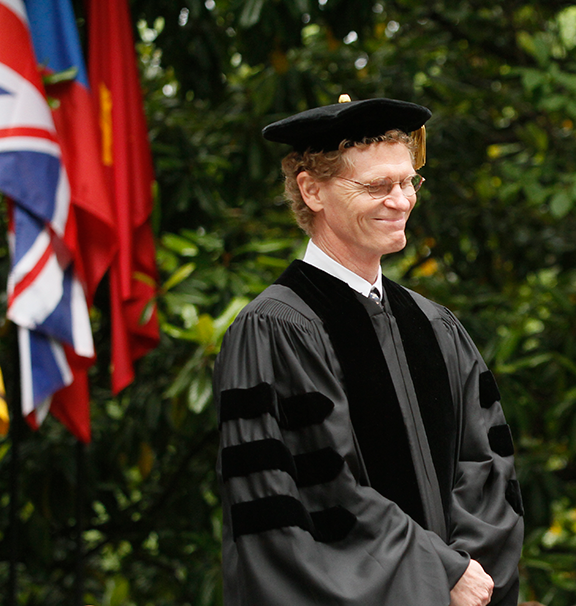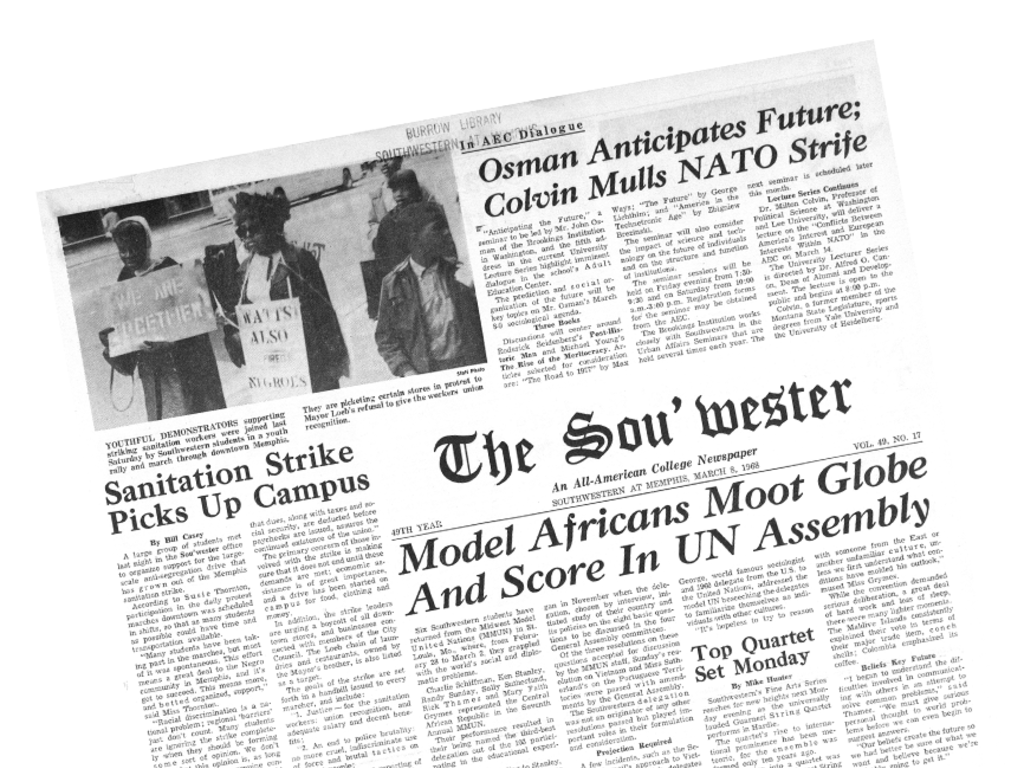In 1968, Professor Michael P. Johnson at LeMoyne-Owen College in Memphis asked students who marched in support of the striking Memphis sanitation workers to write about their experience. Today, Rhodes students are ensuring that these riveting slivers of history become available to the public.
The nearly 100 rare, handwritten eyewitness accounts from the event made their way to Rhodes through what Dr. Charles Hughes, director of the Memphis Center, describes as a bit of serendipity. Rhodes board of trustees chair Cary Fowler ’71 was in town for a board meeting and stopped to sit in on a history class.
“He visited my History of Memphis class,” recalls Hughes, “where we were talking about the roots of the civil rights movement in the 40s and 50s, and in Memphis, the end of the Crump regime.”
Fowler, who is world-famous for his leadership in preserving global crop diversity and the construction of the Svalbard Global Seed Vault in Norway, was active in the Memphis civil rights movement. In fact, he had participated in the March 28, 1968, march that became the subject of the LeMoyne-Owen student accounts, and had been given a copy of them by Johnson.

“I kept them all these years,” says Fowler, “and began to notice that they were never referenced in books about the sanitation workers strike and this period in Memphis.” He made arrangements for Rhodes to acquire the accounts.
The accounts make for fascinating reading. This one is from “B.P.” (Johnson redacted the names when he knew the accounts would go public):
“I was in the midst of the marchers, and could not see anything in the front or back of me. We were on Main only a few minutes before we heard a noise that seem to rock the doors of Heaven. Tear gas had been thrown into crowd by the ‘police force.’ ”
“My four fellow marchers and I ran for the nearest street, and while running I remember laughing to myself because a group of policemen were out-running us trying to get to safety . . . When I got home that evening I was surprised to learn that all of my sisters and brothers had been dismissed from school because of violent outbursts, fighting and window breaking.”
“I expected everything that happened to happen. When conditions such as police brutality, a government for the white people, and discrimination at every level are brought to a head and become intolerable in the Black Community the result is not very pleasant for anyone . . . (Negroes) want their rights now and will not wait.”
Jessica Johnson ’15, who was part of the Digital Preservation and Scholarship (DPS) team, read all of the LeMoyne-Owen documents, and realized what Fowler had understood: “We don’t really have documentation of what happened in the daily lives of Memphians, of African Americans.”
“Some of the accounts are very dramatic,” said Dr. Suzanne Bonefas, director of Special Projects at Rhodes, who leads the student digitization teams.
When Johnson began reading the LeMoyne documents, she had an interest in their historical value, but then she decided to bring them to life by asking friends to read and record the accounts.
From “E.W.”:
“When I got up on Thursday, March 28, 1968, I knew that there was to be a massive demonstration in downtown Memphis, but until 11, it never dawned on me that there was actually something more than just the peaceful demonstration for the striking sanitation workers.”
We don’t really have documentation of what happened in the daily lives of Memphians, of African Americans.
— Jessica Johnson '15
“At 11, my cousin called me from Carver High School pleading with me to get her out of school. She said that ‘these people have gone crazy over here and I am afraid to stay here.’”
“After I finished talking to my cousin, I turned my radio on and I heard that there was an outbreak of violence at Hamilton High School and that there was violence and window-breaking in the downtown area. My neighbors, by this time, had gotten their children out of school and were in the front yard listening to the radio (WLOK and WDIA). They cheered and laughed uncontrollably as the accounts of vandalism and violence poured out of a transistor radio.”
Says Jessica Johnson, now a law student at Ole Miss: “I wanted to transcribe the stories from an old piece of paper full of illegible cursive to something everyone could see, understand, and believe. I wanted to make them come to life.”
— By Leanne Kleinmann
